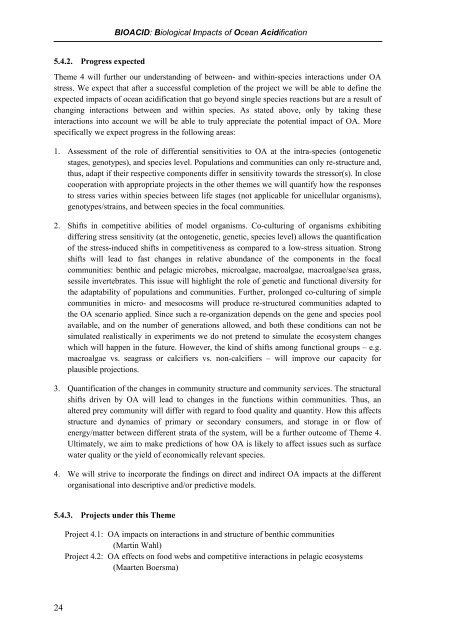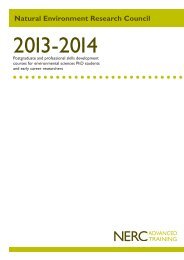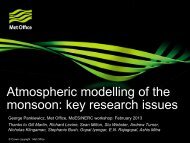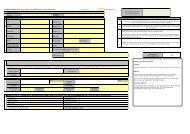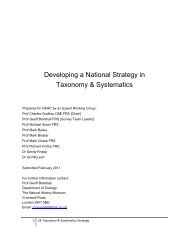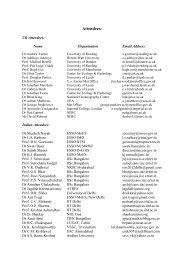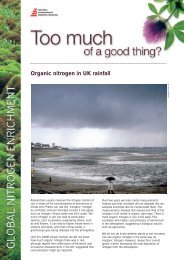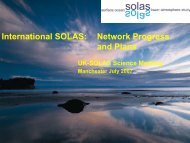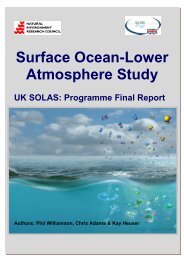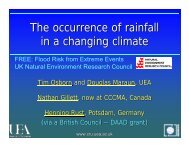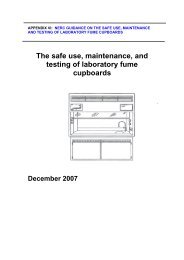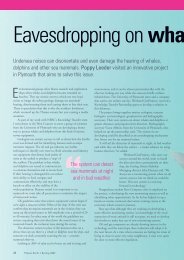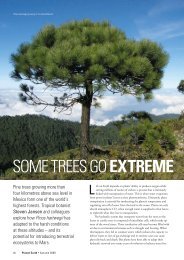BIOACID Programme - Natural Environment Research Council
BIOACID Programme - Natural Environment Research Council
BIOACID Programme - Natural Environment Research Council
Create successful ePaper yourself
Turn your PDF publications into a flip-book with our unique Google optimized e-Paper software.
5.4.2. Progress expected<br />
24<br />
<strong>BIOACID</strong>: Biological Impacts of Ocean Acidification<br />
Theme 4 will further our understanding of between- and within-species interactions under OA<br />
stress. We expect that after a successful completion of the project we will be able to define the<br />
expected impacts of ocean acidification that go beyond single species reactions but are a result of<br />
changing interactions between and within species. As stated above, only by taking these<br />
interactions into account we will be able to truly appreciate the potential impact of OA. More<br />
specifically we expect progress in the following areas:<br />
1. Assessment of the role of differential sensitivities to OA at the intra-species (ontogenetic<br />
stages, genotypes), and species level. Populations and communities can only re-structure and,<br />
thus, adapt if their respective components differ in sensitivity towards the stressor(s). In close<br />
cooperation with appropriate projects in the other themes we will quantify how the responses<br />
to stress varies within species between life stages (not applicable for unicellular organisms),<br />
genotypes/strains, and between species in the focal communities.<br />
2. Shifts in competitive abilities of model organisms. Co-culturing of organisms exhibiting<br />
differing stress sensitivity (at the ontogenetic, genetic, species level) allows the quantification<br />
of the stress-induced shifts in competitiveness as compared to a low-stress situation. Strong<br />
shifts will lead to fast changes in relative abundance of the components in the focal<br />
communities: benthic and pelagic microbes, microalgae, macroalgae, macroalgae/sea grass,<br />
sessile invertebrates. This issue will highlight the role of genetic and functional diversity for<br />
the adaptability of populations and communities. Further, prolonged co-culturing of simple<br />
communities in micro- and mesocosms will produce re-structured communities adapted to<br />
the OA scenario applied. Since such a re-organization depends on the gene and species pool<br />
available, and on the number of generations allowed, and both these conditions can not be<br />
simulated realistically in experiments we do not pretend to simulate the ecosystem changes<br />
which will happen in the future. However, the kind of shifts among functional groups – e.g.<br />
macroalgae vs. seagrass or calcifiers vs. non-calcifiers – will improve our capacity for<br />
plausible projections.<br />
3. Quantification of the changes in community structure and community services. The structural<br />
shifts driven by OA will lead to changes in the functions within communities. Thus, an<br />
altered prey community will differ with regard to food quality and quantity. How this affects<br />
structure and dynamics of primary or secondary consumers, and storage in or flow of<br />
energy/matter between different strata of the system, will be a further outcome of Theme 4.<br />
Ultimately, we aim to make predictions of how OA is likely to affect issues such as surface<br />
water quality or the yield of economically relevant species.<br />
4. We will strive to incorporate the findings on direct and indirect OA impacts at the different<br />
organisational into descriptive and/or predictive models.<br />
5.4.3. Projects under this Theme<br />
Project 4.1: OA impacts on interactions in and structure of benthic communities<br />
(Martin Wahl)<br />
Project 4.2: OA effects on food webs and competitive interactions in pelagic ecosystems<br />
(Maarten Boersma)


